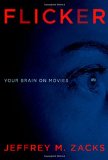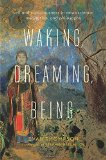new book – ‘Flicker: Your Brain on Movies’ by Jeffrey Zacks
November 17, 2014
Flicker: Your Brain on Movies by Jeffrey Zacks (Oxford University Press, 2014)
How is it that a patch of flickering light on a wall can produce experiences that engage our imaginations and can feel totally real? From the vertigo of a skydive to the emotional charge of an unexpected victory or defeat, movies give us some of our most vivid experiences and lasting memories. They reshape our emotions and worldviews–but why?
In Flicker, Jeff Zacks delves into the history of cinema and the latest research to explain what happens in your head when you sit down in the theatre and the lights go out. Some of the questions Flicker answers: Why do we flinch when Rocky takes a punch in Sylvester Stallone’s movies, duck when the jet careens towards the tower in Airplane!, and tap our toes to the dance numbers in Chicago or Moulin Rouge? Why do so many of us cry at the movies? What’s the difference between what happened in a movie and what happened in real life–and can we always tell the difference? To answer these questions and more, Flicker gives us an engaging, fast-paced look at the mind’s fascinating relationship with the silver screen.
Google Books preview:
See also: Book website







